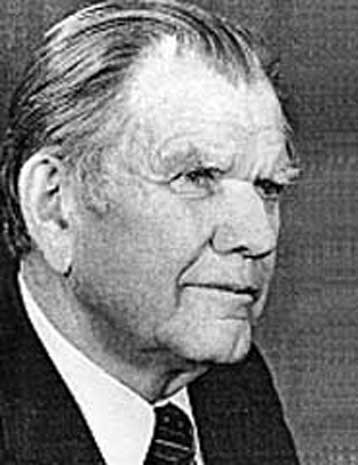Krawchuk, Peter
Krawchuk, Peter [Кравчук, Петро; Kravčuk, Petro; pseudsonyms: Peter Arsen, Marko Terlytsia, Stoianivsky, Ilko, Senkiw, Peter Dawson], b 6 July 1911 in Stoianiv, Radekhiv county, Galicia, d 3 February 1997 in Toronto. Historian, author, journalist, and political activist. He attended a gymnasium in Radekhiv until it was closed down by Polish authorities in 1926. At that time, Krawchuk became active in various local political and cultural organizations, most notably, the Prosvita society and the Ukrainian Peasants’ and Workers’ Socialist Alliance (Sel-Rob; member from in 1927). He also became a member of the Communist Youth League of Ukraine (Komsomol) in 1929 and worked in Lviv for this organization. His political activities as an organizer and public speaker drew the attention of the Polish police authorities. Consequently, with the permission of his father and Komsomol, Krawchuk emigrated to Canada in 1930. He arrived in Winnipeg at the beginning of the Depression and soon joined the local Ukrainian Labour-Farmer Temple Association (ULFTA). He became a member of the Central Committee of its Youth Section in 1931 and secretary in 1932–6. In 1931, Krawchuk was a member of the Central Executive Council of the Association to Aid the Liberation Movement in Western Ukraine. He also joined the Communist Party of Canada (CPC) in 1932. In 1936 he attended the ULFTA Higher Education Course that became well known for its many graduates who later became notable leaders in the Ukrainian left-wing movement.
After he graduated, Krawchuk began his career as a journalist for the newspaper, Ukraïns’ki robitnychi visty. During the years 1937–8, he became a recruiter among the Ukrainian left-wing community for volunteers for the International Brigades in Spain. He continued his early career as a journalist (sometimes using the pen name ‘Arsen’) after the outbreak of the Second World War. When the Communist Party of Canada was outlawed along with related organizations and their leadership in June 1940, Krawchuk was arrested and interned by the Canadian federal government along with the other CPC leaders. He was held in various internment camps and prisons including Kananaskis, Alberta, until 24 July 1941 when he was sent to Petawawa, Ontario, and later (on 20 August 1941) to Hull (Gatineau), Quebec. After he was released on 23 January 1942, he continued his work with the Ukrainian left-wing organizations. He later wrote about his internment in the publication Bez vyny vynuvati (Interned Without Cause, 1985).
After the war, Krawchuk moved with his family to work in Toronto and became an active member of the Association of United Ukrainian Canadians (AUUC). In 1947, he was a member of a delegation to Soviet Ukraine that brought humanitarian aid from Ukrainian Canadians for the postwar reconstruction. After the mission he remained in Ukraine for two years as a ‘special correspondent’ writing for several Ukrainian left-wing newspapers in Canada and the United States of America. He returned home in 1949 and later wrote about his experiences in the book Shistsot dniv na Ukraïni: Zapysky korespondenta (Six Hundred Days in Ukraine: A Correspondent’s Notes). During that period, Krawchuk praised the achievements of the Soviet Union and opposed the immigration of Ukrainian displaced persons to Canada. On a few occasions, his speaking engagements at various locations in Canada were disrupted by anti-Communist Ukrainian displaced persons and these instances were reported in the local press. In the 1950s and 1960s, he held various positions on the national executive of the AUUC and continued to contribute to their newspapers. After the death of John Navis (Ivan Navizivsky) in 1954, Krawchuk became the leading Communist ideologue in the Ukrainian Canadian community. For several decades, he regularly visited Soviet Ukraine to attend various conferences and meetings and formed friendships with poets, artists and writers. He was also consulted by Soviet Ukrainian academics interested in American and Canadian studies. During his many visits to Soviet Ukraine, he became personally aware of the successes and failures of the Soviet system. He became concerned by the Russification trends in Soviet Ukraine and in 1967 became a member of a six-man CPC delegation to Ukraine to study this problem. A report was published by this delegation critical of the Soviet nationality policy. This document, known as the Kiev Report, became a controversial issue within the Communist Party of Canada and in October 1967 it was withdrawn as an official CPC document under pressure from the Communist Party of the Soviet Union.
Krawchuk continued his journalistic and organizational activities and regularly visited and spoke at AUUC branches across Canada. After 1955, he became a member of the Board of Directors of Ukrainska Knyha and Taras Investments and treasurer of Globe Tours—commercial enterprises affiliated with AUUC. He wrote about his travels in the press and these articles would often appear as publications. During his career, Krawchuk published numerous articles and over forty books including several that were translated into English by Mary Skrypnyk. He continued in his profession as a journalist until his retirement in 1991. During his lifetime, Krawchuk received several awards from Soviet Ukraine. Nevertheless, he supported the 1991 Ukraine’s Declaration of Independence. His memoirs Bez nedomovok (Without Leaving Things Unsaid) were published in Ukraine in 1996. He also published a history of the Association of United Ukrainian Canadians entitled Our History.
Myron Momryk
[This article was updated in 2022.]

